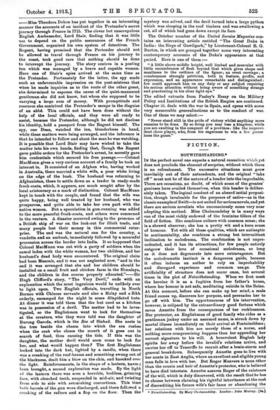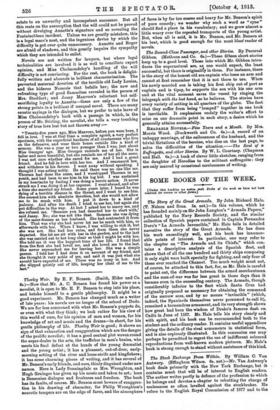FICTION.
NOTWITHSTANDING.*
IN the perfect novel one expects a natural causation which yet does not preclude the element of surprise, without which there is no refreshment. The successive situations must grow inevitably out of their antecedents, and the original " take off " must not be of the nature of a header into the improbable. There are occasions, no doubt, of which some of the greates' geniuses have availed themselves, when this header is deliber- ately taken. The logical conduct of an absurd initial proposi- tion, though invaluable for the purposes of satire—as in the classic example of Swift—is not suited for serious novels, and yet there are serious novelists who unconsciously come very near adopting this method. Miss Cholmondeley is in many ways one of the most richly endowed of the feminine tillers of the field of fiction. She combines culture with common sense; she is a shrewd observer; she has a pretty wit and a keen sense of humour. Yet with all these qualities, which are antiseptic to sentimentality, she combines a strong but intermittent inclination to melodrama. The combination is not unpre- cedented, and it has its attractions, for few people entirely outgrow their love of occasional melodrama, so long as it does not degenerate into mere extravagance. But the melodramatic instinct is a dangerous guide, because it often induces an author to rely on improbability and disregard experience and common usage. This artificiality of structure does not occur once, but several times in the plot of Notwithstanding. When we first meet the heroine it is as a fugitive from her father's house, where her honour is not safe, meditating suicide in the Seine. At this moment, before she can make up her mind, a male friend comes up, discovers her purpose, and persuades her to go off with him. The opportuneness of his intervention, however, is eclipsed by the extraordinary good fortune which saves Annette from the consequences of her recklessness. Her protector, an Englishman of good family who rides as a gentleman jockey under an assumed name, is struck down by mortal illness immediately on their arrival at Fontainebleau; her relations with him are merely those of a nurse, and nothing more compromising happens than her appending her correct signature to his will. A benevolent English lady spirits her away before the invalid's relations arrive, and carries her off to Teneriffe to recruit after a brain-storm and general breakdown. Subsequently Annette goes to live with her aunts in East Anglia, where an excellent and eligible young man falls in love with her. But Roger Manvers is none other than the cousin and heir of Annette's protector, who is believed to have died intestate. Annette assures Roger of the existence of the will, which is duly discovered, with the result that he has to choose between claiming his rightful inheritance at the cost of discrediting his future wife's fair fame or abandoning the
• Notwithstanding. By Mary Cholmondoley. London: John Murray. [6s.]
estate to an unworthy and incompetent successor. But all this rests on the assumption that the will could not be proved without divulging Annette's signature and so revealing the Fontainebleau incident. Unless we are greatly mistaken, this is a legal mare's nest, and the ingenious device by which the difficulty is got over quite unnecessary. Annette and Roger are afraid of shadows, and this greatly impairs the sympathy which they are intended to enlist.
Novels are not written for lawyers, but where legal technicalities are involved it is as well to conciliate expert opinion, and Miss Cholmondeley's handling of the will difficulty is not convincing. For the rest, the book is delight- fully written and abounds in brilliant characterisation. The perverted maternal devotion of the terrible old Lady Louisa, and the hideous Nemesis that befalls her; the new and refreshing type of good Samaritan revealed in the person of Mrs. Stoddart ; and Janey Manvers's reluctant but self- sacrificing loyalty to Annette—these are only a few of the strong points in a brilliant if unequal novel. There are many caustic sayings in the dialogue, but we prefer to take leave of Miss Cholmondeley's book with a passage in which, in the person of Mr. Stirling, the novelist, she tells a very touching story of true love lost but not thrown away :— " Twenty-five years ago, Miss Manvers, before you were born, I fell in love. I was at that time a complete egoist, a very perfect specimen, with the superficial hardness of all crustaceans who live on the defensive, and wear their bones outside like a kind of armour. She was a year or two younger than I was, just about Miss Georges' age. Miss Georges reminds me of her. She is taller and more beautiful, but she reminds me of her all the same. I was not sure whether she cared. for me. And I had a great friend. And he fell in love with her too. And I renounced her, and withdrew in his favour. I went away without speaking. I thought I was acting nobly. He said there was no one like me. Thoreau had done the same, and I worshipped Thoreau in my youth, and had been to see him in his log hut. I was sustained in my heartache by feeling I was doing a heroic action. It never struck me I was doing it at her expense. I went abroad, and after a time she married my friend. Some years later, I heard he was dying of a terrible disease in the throat, and I went to see him. She nursed him with absolute devotion, but she would not allow me to be much with him. I put it down to a kind of jealousy. And after his death I tried to see her, but again she put difficulties in the way. At last I asked her to marry me, and she refused me. 'Because you had deserted her to start with,' said Janey. No ; she was not like that. Because she was dying of the same disease as her husband. She had contracted it from him. That was why she had never let me be much with him, or afterwards with her. When I knew, I was willing to risk it, but she was not. She had her rules, and from them sho never departed. She let me sit with her in the garden, and to the last she was carried out to her long chair so that I might be with her. She told me it was the happiest time of her life. I found that from the first she had loved me, and she loved me to the last. She never reproached me for leaving her. She was a simple person. I told her I had done it on account of my friend, and she thought it very noble of me, and said it was just what she snould have expected of me. There was no irony in her. And she slipped quietly out of life, keeping her ideal of me to the last."



































































 Previous page
Previous page